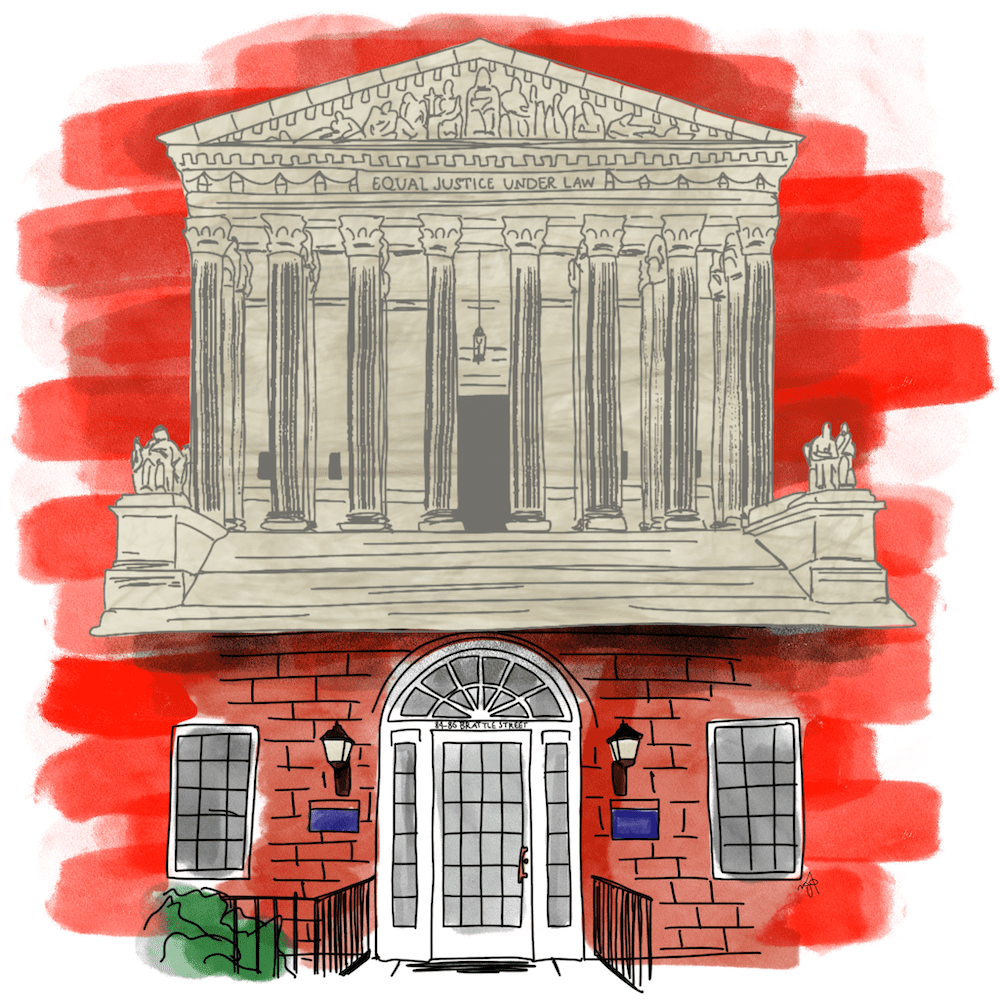Supreme Court, federal courts to hear cases that could end affirmative action
While the Supreme Court will decide on two cases brought by Students for Fair Admissions against Harvard and UNC, a lower court will hear the anti-affirmative action group’s lawsuit against Yale.

Zoe Berg
This year, the Supreme Court is set to review cases against Harvard University and the University of North Carolina-Chapel Hill that could end affirmative action nationwide as Yale waits to defend its own use of the practice in a Connecticut federal court.
In 2014, the anti-affirmative action group Students for Fair Admissions — or SFFA — filed lawsuits against Harvard and UNC, accusing the universities of discriminating against white and Asian American applicants. After lower courts affirmed both universities’ rights to race-conscious admissions practices in the following years, SFFA petitioned the Supreme Court to hear the case.
The Supreme Court agreed to review the Harvard and UNC cases together in Jan. 2022, setting itself up to determine the future of affirmative action throughout the United States.
“The stakes are high and the ruling could be very far reaching,” Linda Greenhouse, a clinical lecturer and senior research scholar at Yale Law School and former New York Times Supreme Court reporter, wrote to the News. “It’s no exaggeration to say that what’s on the line is the ability of colleges and universities (and private secondary schools, for that matter) to take applicants’ race into account in their effort to construct a diverse class or maintain diversity in the student body.”
In Feb. 2021, SFFA filed a lawsuit against Yale, in a complaint that echoes the Harvard and UNC cases. SFFA accused the University of violating Title VI of the 1964 Civil Rights Act. Title VI bars any institution receiving federal funding from discriminating on the basis of race, color or national origin. Citing race-conscious admissions practices, the lawsuit claims that the University discriminates against white and Asian American applicants.
In May 2021, Yale lawyers petitioned Connecticut courts to hold the SFFA suit until there is a decision in the Harvard case. Later that month, courts approved the petition, so the Yale lawsuit will sit in the District Court of Connecticut pending the Supreme Court decision.
“Yale, Harvard, the University of North Carolina, the University of Texas and many dozens of other highly competitive colleges and universities employ admissions practices that are discriminatory, unnecessary, and unconstitutional,” Edward Blum, the president of SFFA, wrote in a press release. “Students applying to undergraduate and postgraduate programs should be judged on their individual talents, character, academic skills, extracurricular achievements and socio-economic background but not the color of their skin.”
In previous years, Yale weathered a long legal battle over its use of race-conscious admissions practices. In April 2018, the Trump administration’s Department of Justice began investigating a 2016 complaint against Yale by the Asian American Coalition for Education, which alleged that Yale discriminated against Asian American applicants. After announcing the results of its investigation — that Yale violated Title VI of the Civil Rights Act — the DOJ sued Yale for discriminating against white and Asian American applicants in Oct. 2020. Under the Biden administration, the DOJ dropped the lawsuit in Feb. 2021.
Yale has consistently defended universities’ use of affirmative action and asserted that its own admissions practices comply with federal law and the Constitution. University President Peter Salovey has repeatedly called the claims of discrimination made against Yale “baseless,” and other university officials have maintained that race-conscious admissions practices allow Yale to create a diverse student body. University Provost Scott Strobel pointed to 40 years of precedent in which the court upheld affirmative action.
“For decades, Yale has created an academically excellent and diverse student body through admissions policies that comply fully with the decisions of the Supreme Court and that do not discriminate against any racial or ethnic group,” University spokesperson Karen Peart wrote to the News following SFFA’s filing. “The lawsuit that SFFA filed today simply resurrects the misleading statistics, factual errors, and legal misstatements that the Trump administration included in its suit, which the Department of Justice has since withdrawn.”
As the nation awaits the Supreme Court’s review of the Harvard and UNC cases, several experts expressed they believe that the Court will rule race-conscious admissions practices unconstitutional. Citing the Court’s three newest conservative additions — Justices Neil Gorsuch, Brett Kavanaugh ’87 LAW ’90 and Amy Coney Barrett — constitutional law scholar Charles Fried told the News that the conservative-majority “Trump Court” will likely overturn precedent cases upholding affirmative action. Greenhouse agreed that it is “extremely unlikely” the Court will protect affirmative action, since its choice to hear the case indicates a majority of justices “want to change current law.” While Fried noted the Court’s recent history of rejecting race-conscious policies, Greenhouse speculated that the Court may go so far as to challenge the “bedrock assumption” that diversity is a compelling state interest.
Others have raised questions about what ‘colorblindness’ may look like in admissions practices if the Court sides with SFFA. Daniel Rubinfeld, professor emeritus of law and economics at the University of California, Berkeley told the News that the essays, interviews and activities that comprise a student’s application may indicate their racial background anyways. Meanwhile, David Card, a labor economist at UC Berkeley whose research is used in the defendants’ case against SFFA, estimated that ending such practices would cut the proportion of students identifying as Black, Hispanic and “other” by nearly 50 percent.
In one 2019 survey distributed by the News, 74.06 percent of Yale undergraduates said they supported the use of affirmative action.



